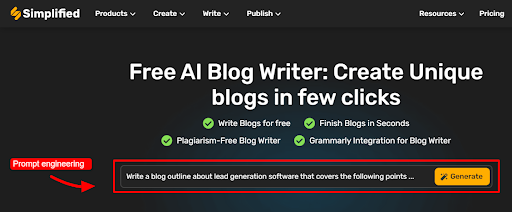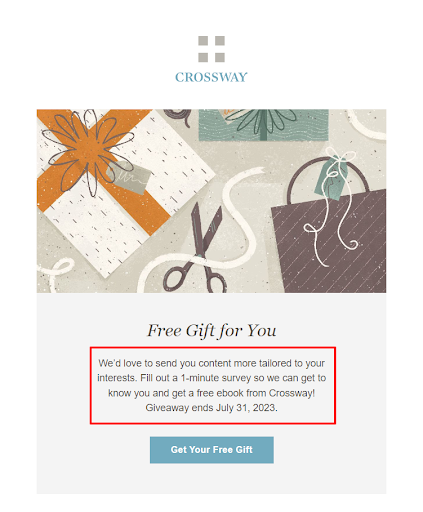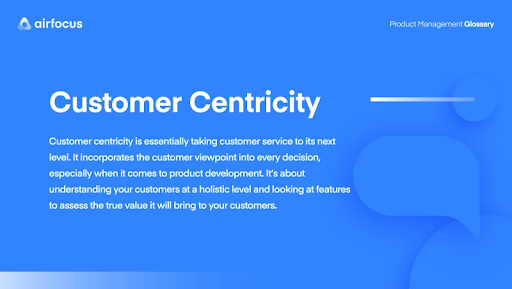Want to differentiate your B2B branding from the rest?
Then, you must understand what makes it more valuable, relevant, and impactful than your competitors’ businesses. You must also know how to communicate this to your ideal customer using their preferred messaging style and marketing channels.
If you’re ready to dig up the roots to examine what makes your B2B brand stand out, we’re here to help.
Today, we’re taking a closer look at the importance of B2B brand building to drive business differentiation — and ultimately growth — in 2024.
Ready to learn more?
Let’s take a look.
What are the trends shaping b2b brand strategy and management in 2024 (with examples)
Here are some of the top trends shaping brand strategy and management in 2024:
Interactive content experiences
Strong b2b brands in 2024 are connecting customers and generating more leads by creating immersive content experiences, such as:
- Interactive infographics
- Polls and quizzes
- Interactive videos
- Assessments
- Gamification
- Calculators
- Webinars
Discover: How to Create Interactive Content That Engages Your Audience
With the help of interactive content creation platforms, organizations are planning and batching immersive content experiences for their B2B buyers seamlessly. These platforms offer template libraries and managers, content builders, custom branding, and team collaboration features so you can create interactive content like an assembly line.
If you want to enhance audience engagement, brand authority, and customer perception with interactive content experiences, then you’ll love Foleon. See your branded content in a Foleon Doc.
The use of Artificial Intelligence (AI) apps
AI tools are also impacting brand strategy decisions in 2024, helping B2B companies streamline content planning, production, and distribution.
From brainstorming topic lists to generating social media captions to strategizing blog outlines, B2B brands in 2024 are using AI to save time and resources.
Text-to-speech technology is taking the world by storm as brands look to it to create engaging and personalized audio experiences for their audiences. This software helps B2B organizations produce video and audio content in various languages, tones, and styles, making it ideal for those who serve a global audience.
AI blog writers are also reshaping content production as brands turn to them to rewrite clunky sentences, summarize key ideas, and define terms. These AI “writing assistants” help content teams complete more work in less time without sacrificing quality.
How? Using prompt engineering strategies, content creators direct AI writers to generate relevant copy. They then edit the generated text to their brand’s unique voice, style, and tone.

Hyper-personalization
Taking hyper-personalization seriously is key to driving customer loyalty and long-term B2B business success in 2024.
To meet customer expectations, brands are crafting one-of-a-kind experiences tailored to their prospects' and clients' preferences. Doing so consistently helps them deliver meaningful content and builds trust and deeper connections.
Beyond tracking purchasing behavior and user preferences, organizations are also sending out feedback forms and surveys to get a closer look into the minds and eyes of their target audiences.

We’ll touch on hyper-personalization throughout this article, so keep reading for more insights.
How are brand building and differentiation measured?
Formulating and differentiating B2B brand strategies takes careful consideration, research, and testing.
While there’s no straightforward approach, B2Bers can solicit and act on insights from their leads, customers, and stakeholders to facilitate a co-creation process and build brands that stand out.
B2B companies can uncover how their brands are being perceived by:
- Gathering feedback from customers via surveys and feedback forms
- Conducting focus groups together with the customer success marketing team.
- Interviewing customers across a variety of segments
- Monitoring brand sentiment via social media listening tools
- Keeping a close eye on competitor activities, including their advertising campaigns, product launches, and pricing strategies, to compare how they’re setting themselves apart in the market
Discover: What are the most important B2B marketing KPIs?
What are the central themes in driving brand differentiation?
The core pillars that drive brand differentiation include:
Competitive advantage (unique value proposition - UVP)
A brand's UVP is the core message that describes what sets it apart from its competitors.
A strong UVP encompasses the unique benefits and value brands offer to customers. By clearly defining and effectively communicating their UVP, brands can establish a strong competitive advantage and attract target audiences.
Brand personality
A brand's personality reflects its values, tone of voice, and overall character. It shapes how customers perceive and connect with the brand. By developing a distinct and authentic personality, brands can create emotional connections with customers that foster loyalty and affinity.
Customer trust and loyalty (user-generated content - UGC)
Customers trust what other customers say about a brand more than direct brand messaging.
By leveraging user-generated content, brands can harness the power of authentic customer testimonials, reviews, and experiences to:
- Nudge qualified prospects to conversion
- Foster long-term customer relationships
- Build rapport with leads
Customer centricity
Putting the customer at the center of everything is vital for success in today's market. By truly understanding their needs, preferences, and pain points, brands can create products, services, and experiences that resonate with customers, driving satisfaction and brand loyalty.

Brand authority
Establishing authority within an industry positions a brand as a trusted expert and go-to resource for customers. By consistently delivering high-quality content, thought leadership, and valuable insights, brands can become authoritative sources in their respective fields.
Innovation
Brands that embrace and drive innovation can stand out in a crowded market. By continuously evolving and offering innovative solutions, products, or services, organizations can capture their audiences’ attention, drive engagement, and stay ahead of the competition.
Authenticity
Authenticity is critical to building trust and establishing lasting relationships with customers. By staying true to their values, being transparent, and delivering on promises, brands can create authentic connections that resonate with their ideal clients.
Sustainability perception
In today's environmentally conscious world, specific audience segments value brands that prioritize sustainability. Businesses that demonstrate a commitment to sustainable practices and communicate their efforts effectively can attract and retain customers who align with their values.
By incorporating these central themes into their brand strategy, B2B businesses can differentiate themselves, attract customers, foster loyalty, and drive long-term success in today's competitive marketplace.
How content creation platforms play a significant role in driving branding strategy
Content creation platforms play a significant role in driving branding strategy by providing the necessary tools, features, and capabilities to create, distribute, and manage branded content effectively.
Sound like a mouthful?
Let’s break it down:
Consistent branding
Content creation platforms typically provide templates, design assets, and style guides that ensure visual consistency in branding elements, such as:
- Custom buttons
- Signatures
- Imagery
- Colors
- Logos
- Fonts
By using these platforms, content creation teams can produce and customize content in alignment with their organization’s brand identity, reinforcing recognition and differentiation. More on this in a bit.
Streamlined workflows
Content creation platforms often offer collaborative features that facilitate efficient workflows among team members involved in the content creation process.
These workflows allow seamless collaboration, communication, and content review cycles, streamlining marketing collateral production from all angles.
Content repurposing
Content creation platforms provide tools and functionalities for repurposing content across different formats and channels.
By repurposing content, brands can extend their reach, increase engagement, and reinforce their brand message across different touchpoints, amplifying their branding strategy.
By attaching branded elements to their repurposed assets, such as company logos, call-to-action (CTA) buttons, email signatures, and email sign-offs, B2B organizations can ensure consistent branding — and stay seen — across all of their communication channels.
Data-driven insights
Brands can leverage data-driven insights provided by content creation platforms to measure the effectiveness of their assets, understand audience behavior and preferences, and refine their branding strategy accordingly.
*Monitoring audience responses and applying what was learned is vital to staying committed to hyper-personalization.
Discover: Content Intelligence That Uncovers the Insights That Matter
Brand storytelling
Brands can leverage interactive templates and formats to craft engaging content that resonates with their target audiences, communicates brand values, and reinforces the brand narrative.
Organizations can customize these templates according to their style guides to save time producing batched content.
Discover: Why Data-Driven Storytelling Is the Best B2B Marketing Content
Wrap up
And that’s B2B branding and differentiation in a nutshell!
Now, over to you.
Are you ready to elevate the customer experience, share tremendous value, and stand apart from the pack? Meet with your marketing team and create a plan to implement the B2B branding insights we shared in today’s guide.
And don’t forget to give Foleon a try!
Our beautiful, interactive content templates can help you enhance customer perception, brand authority, and audience engagement in just a few clicks. Request a demo or sign up for a plan today.

